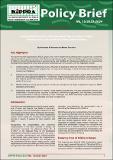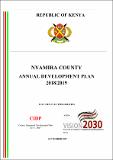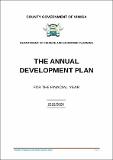| dc.description.abstract | The ASALs are characterized by long droughts, famine,
lack of water and pasture, low levels of education,
poor transport and communication infrastructure and
inadequate governance from the National government.
The livelihoods in the ASALs are mainly pastoralism
-based, which entails the movement of humans and
animals in search of pasture for their livestock and
water.
Recognizing the social-political and economic
marginalization in the ASAL counties in Kenya, the
government launched the Sessional Paper No. 8
of 2012” on the “National Policy for the Sustainable
Development of Northern Kenya and other Arid Lands’’,
which provides harmonization and institutionalization
of appropriate policy responses to the marginalization
and under-development of ASALs. This admission by
the government that the region needs specific policy
responses to address the challenges of ASALs recognized
the significant role of NGOs as alternative public service
providers, complementing the government’s role in
promoting the development of ASALs.
While the country has a substantial number of registered
non-governmental organizations (NGOs), the persistent
problems in ASALs need a rethinking of their missions,
objectives, contributions, and impact, and while Kenya
has over 12,000 registered NGOs, their role may be
expanded to address these present challenges. This
policy brief synthesises findings from comprehensive
research done in Garissa County and provides a set
of practical suggestions targeted at reinvigorating and
maximizing the contributions of NGOs in promoting the
development of ASALs in Kenya. | en |



